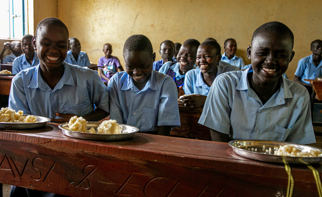Germany has provided another USD 65 million to UNICEF and the World Food Programme (WFP) to strengthen community resilience to various shocks in South Sudan.
According to a Thursday joint UNICEF-WFP press release, the funding comes at a time when 9.3 million people, about 70 percent of the 13.4 million population, are estimated to require humanitarian assistance.
“The contribution channelled through KfW, the German Development Bank, will be used to support close to one million people, under the Joint Resilience Project Phase II in South Sudan, targeting urban and peri-urban areas in Juba, Torit, Yambio, and Aweil,” the joint statement reads in part. “The German funding will be used to provide education, health, livelihood, as well as water, sanitation, and hygiene services (WASH), child protection, and prevention of Gender Based Violence activities. Some funds will be used to improve education infrastructure, including renovating classrooms and providing daily school meals, a complementary health intervention that helps build human capital.”
Gregory Bledjian, Head of Mission of Germany to South Sudan, said enhancing food and nutritional security, improving education, and fostering social cohesion avert long-term dependence on humanitarian aid.
“South Sudan has enormous potential to be self-reliant. The second phase of the Joint Resilience Project helps to unlock this potential,” he stated. “Germany is proud to support the South Sudanese people on this trajectory for development.”
For her part, Noala Skinner, UNICEF Representative in South Sudan, said the generous contribution from Germany is timely and will have a profound impact on some of the most vulnerable children in South Sudan.
“It will enable UNICEF to scale up critical interventions – from treating severe malnutrition and ensuring access to clean water, to supporting essential health and education services, and protecting children from harm,” she said.
Meanwhile, Adham Effendi, WFP’s Acting Representative and Country Director in South Sudan, said they are deeply grateful for the support from Germany, whose funding strengthens their commitment to empowering communities in South Sudan.
“This support is not just aid – it is an investment in lasting resilience, food security, and dignity of the people we serve,” he stated.
The Joint Resilience Project Phase II aims to consolidate the gains made during the first phase while providing an opportunity for geographic expansion in other parts of the country. Germany already provided more than USD 120 million for the first phase of the Joint Resilience Project, which started in 2019 and benefited 550,000 people.




